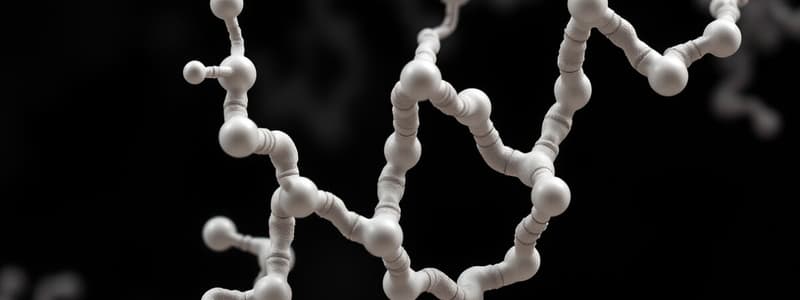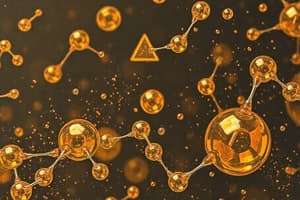Podcast
Questions and Answers
Which characteristic defines non-polar amino acids?
Which characteristic defines non-polar amino acids?
- Their R-groups are hydrophobic. (correct)
- They are soluble in water.
- They contain polar side chains.
- They are all essential amino acids.
How many standard amino acids are classified as non-polar?
How many standard amino acids are classified as non-polar?
- 10
- 6
- 8 (correct)
- 12
What defines polar-neutral amino acids?
What defines polar-neutral amino acids?
- They contain an amino group in their R-groups.
- They are always essential amino acids.
- They are hydrophobic in nature.
- They have polar but neutral side chains. (correct)
Which of the following is true about essential amino acids?
Which of the following is true about essential amino acids?
Which category does not represent polar amino acids?
Which category does not represent polar amino acids?
What is the primary factor that hinders rotation of groups around the C-N bond in amino acids?
What is the primary factor that hinders rotation of groups around the C-N bond in amino acids?
What are conjuget proteins characterized by?
What are conjuget proteins characterized by?
In an alpha-helix structure, where do the R-groups of the amino acids reside?
In an alpha-helix structure, where do the R-groups of the amino acids reside?
Which type of protein structure is primarily concerned with the arrangement of atoms in the backbone?
Which type of protein structure is primarily concerned with the arrangement of atoms in the backbone?
Which is the preferred orientation in the peptide bond due to rotation constraints?
Which is the preferred orientation in the peptide bond due to rotation constraints?
What type of protein structure results in the overall three-dimensional shape?
What type of protein structure results in the overall three-dimensional shape?
What distinguishes lipoproteins from other types of proteins?
What distinguishes lipoproteins from other types of proteins?
What interactions contribute to the tertiary structure of proteins?
What interactions contribute to the tertiary structure of proteins?
Why can proteins from different sources, like insulin from pigs and humans, differ in response?
Why can proteins from different sources, like insulin from pigs and humans, differ in response?
Which prosthetic group is included in metalloproteins?
Which prosthetic group is included in metalloproteins?
Which type of bond is characterized as a strong covalent bond between two cysteine groups?
Which type of bond is characterized as a strong covalent bond between two cysteine groups?
What type of interaction occurs when there is a salt bridge between charged chains of acidic and basic amino acids?
What type of interaction occurs when there is a salt bridge between charged chains of acidic and basic amino acids?
Which of the following arrangements is NOT part of the secondary structure of proteins?
Which of the following arrangements is NOT part of the secondary structure of proteins?
In the context of hydrogen bonding, which of the following is NOT a requirement for hydrogen bonding to occur?
In the context of hydrogen bonding, which of the following is NOT a requirement for hydrogen bonding to occur?
How many of the 20 standard amino acids are considered essential for growth in children?
How many of the 20 standard amino acids are considered essential for growth in children?
Hydrophobic interactions primarily occur between which types of side chains?
Hydrophobic interactions primarily occur between which types of side chains?
Which amino acid is incorrectly described as having a chiral center?
Which amino acid is incorrectly described as having a chiral center?
What is the outcome of protein hydrolysis?
What is the outcome of protein hydrolysis?
What type of structure arises due to hydrogen bonding between the N-H group of one amide and the C=O group of another?
What type of structure arises due to hydrogen bonding between the N-H group of one amide and the C=O group of another?
In amino acid nomenclature, what is the emergency number designation for Glutamine?
In amino acid nomenclature, what is the emergency number designation for Glutamine?
Which statement regarding peptide bonds is false?
Which statement regarding peptide bonds is false?
Which of the following interactions is characterized by attractions between uncharged molecules in an aqueous environment?
Which of the following interactions is characterized by attractions between uncharged molecules in an aqueous environment?
What is the charge of an amino acid at a pH above its isoelectric point?
What is the charge of an amino acid at a pH above its isoelectric point?
Which of the following amino acids fits the specific convention of having its -NH3+ group positioned on the left?
Which of the following amino acids fits the specific convention of having its -NH3+ group positioned on the left?
Which of the following statements about natural amino acids is true?
Which of the following statements about natural amino acids is true?
Which structure helps determine the primary structure of a protein?
Which structure helps determine the primary structure of a protein?
What type of proteins contain only amino acids as their subunits?
What type of proteins contain only amino acids as their subunits?
What arrangement do the bond angles in a peptide create?
What arrangement do the bond angles in a peptide create?
Which group is positioned at the top when drawing Fischer projection formulas for amino acids?
Which group is positioned at the top when drawing Fischer projection formulas for amino acids?
What is the characteristic arrangement of a protein with multiple polypeptide chains?
What is the characteristic arrangement of a protein with multiple polypeptide chains?
How many amino acid residues are commonly found in proteins?
How many amino acid residues are commonly found in proteins?
Study Notes
Amino Acids Classification
- Non-polar amino acids have hydrophobic R-groups and are insoluble in water.
- Eight out of the twenty standard amino acids are classified as non-polar, typically situated in the protein interior to avoid polarity.
- Polar amino acids possess polar R-groups, subdivided into three types: polar neutral, polar acidic, and polar basic.
- Polar-neutral amino acids have neutral side chains; essential for protein synthesis and must be obtained through diet.
- Essential amino acids, unable to be synthesized by the human body, total nine out of twenty standard amino acids, crucial for growth in children.
Nomenclature
- Common names and three-letter abbreviations are widely used for amino acids.
- The first letter of the amino acid's name is capitalized in the three-letter abbreviation, followed by two lowercase letters.
- One-letter symbols facilitate easy comparison of amino acid sequences; this typically corresponds to the first letter of the amino acid.
Chirality and Amino Acids
- All standard amino acids (except glycine) have four distinct groups attached to the alpha-carbon, indicating chiral centers.
- Nineteen out of twenty amino acids are L-isomers, with D-amino acids being less common and found mainly in bacteria.
- Fischer projection for amino acid structures places the --COOH group at the top, R group at the bottom, and the NH2 group in the horizontal position.
- Amino acids exhibit different charges based on their pH, existing as zwitterions at the isoelectric pH.
Peptide Bonds
- Peptides are formed when amino acids are linked via peptide bonds, established between the amino group of one and the carboxyl group of another.
- Lengths of amino acid chains vary widely, with more than one polypeptide chain possible in proteins.
- Dipeptides contain two amino acids connected by a single peptide bond, while proteins can have extensive polypeptide chains and exhibit complex arrangements.
Protein Structure
Primary Structure
- The primary structure is the unique sequence of amino acids in a polypeptide chain, determined by genetic coding.
- Proteins from the same organism share identical sequences, while proteins from different sources may show similarities but differ slightly in response due to structural variations.
Secondary Structure
- The secondary structure refers to the localized regions in a protein, primarily a-helix and b-pleated sheet formations.
- Hydrogen bonding between amino acids in the same chain stabilizes the a-helix and b-pleated sheet structures, causing predictable patterns of folding.
Tertiary Structure
- The tertiary structure represents the overall three-dimensional shape of a protein, influenced by interactions between R groups.
- Four main interactions contribute to stability: disulfide bonds (strong covalent links between cysteine residues), electrostatic interactions (salt bridges), hydrogen bonding, and hydrophobic interactions (between non-polar side chains).
Protein Hydrolysis
- Hydrolysis of proteins reverses peptide bond formation, generating amines and carboxylic acids, thus breaking down the protein structure.
Studying That Suits You
Use AI to generate personalized quizzes and flashcards to suit your learning preferences.
Description
This quiz focuses on non-polar amino acids and their characteristics, highlighting their hydrophobic nature. It includes details on the R-groups of these amino acids and their role in protein structure. Test your knowledge of the 8 standard non-polar amino acids and their functions.




